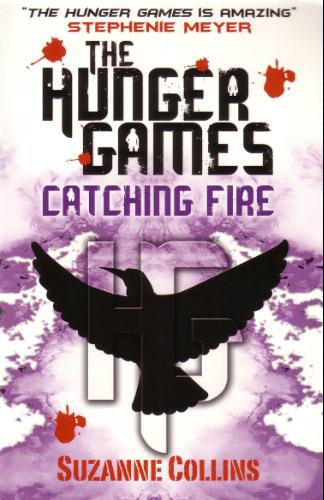Title: Catching Fire, Hunger Games Pt. 2
Pages: 391
Formats: Hardcover, Large Print / Paperback / Audio CD / September 1 Edition
Languages Available: Available in most of the world, over 25 languages
Price: $10.70 [Buy and Save at
Amazon]
Some books are undeniably important. Some say that there are various books that are a landmark of our generation, books that can undeniably shock us with how amazing it is. Some say it is the storyline, no matter how modern or far-fetched. Some say it may be the power of the writing, or the overall atmosphere. Numerous books have been called so, like
The Catcher in the Rye, Lord of the Rings, To Kill a Mockingbird, and Gone with the Wind. The absence of said popularity has otherwise made modern day books more desirable, wondering which one will be the next big hit.
Unfortunately, this is not one of those.
You probably thought I was going to lead up a large, fanboyish paragraph that would honor this book as one of the modern day achievements. But guess what: it's not. In fact, this is otherwise rehashed material forgotten from the last, remarkable book. Many of Collins' followers, and critics alike, call this an adventure book that can not be topped, as one of the single darkest, most emotionally packed books of the summer, even better than the first. Unfortunately, this is not another
Maze Runner or another
Girl with the Dragon Tattoo, and so on. This can be considered surplus from the first book.
Perhaps unfitting to this book is the fact that you already know what to expect. The first half is significantly better than the second, with more progression. Here's how it begins: Katniss Everdeen and Peeta Mellark have survived the Hunger Games, for the first time in the history of the seventy-three years before it. The president of Panem, Snow, does not approve. He is very angry, and so is the Capitol. She has survived against all the odds, made them basically a laughing stock of the Districts. But this is just as depressing as the first bummer games. Katniss has become all but paranoid: she is distrustful of her mother, hostile towards her mentor, Haymitch, blatantly forgets her relationship with Peeta more than once, after that dumb bitch stood him up in the last book, when he blindly admitted love for her. Everybody else she hates or wish they'd die. She only cares for Prim and her friend Gale, who are ironically the weakest characters in the book, in my opinion. And the former is all but explained in this book. It isn't until the third book you know more about Prim, so thankfully that seemingly important character wouldn't be a "third time's the charm case".
So Snow finally becomes so angry, that the Capitol issues a punishment for Katniss Everdeen and Peeta Mellark. And it isn't torture, it isn't public execution. I bet you can guess what it is, fellow readers. Yeah, Hunger Games never was deep in full story exploration, and Catching Fire otherwise confuses it. First, why is the Capitol so violent? Second, wouldn't the citizens of the Districts be careful about what they say? Why are they so offended by her actions when, in actuality, they execute anybody who talks about them negatively. So they'd know to watch their mouths. And third, how can one girl cause them to rage war against an entire section of the United States. The story furthers its confusing plotline, and it is more choppy than the first.
And when Katniss does her punishment, it becomes
far too deja vu. Yeah, you guessed it: she goes back to the stage of history, this time in the form of a beach. In defense, Katniss and Peeta are explored further. Right before entering, the two lovers rehash. (I wonder if they know they've had more of a rocky relationship than Sam and Diana from Cheers?) But they're just friends. Yeah, right. They meet a bunch of weird, violent people again, and you already know what to expect: District 2 is violent, District 11 is lighter, and everybody gets killed. That starts to change after the initial build up, though.
This is basically the more action-packed version of it, but the action scenes don't make sense. Acid rain, monkeys, and electric fences called forcefields. Okay? Whatever the hell that means.
Again in the defense of this book, the writing is top-notch. The details of the book are spot on, describing a very depressing, violent, angsty dystopia. But compared to the first book, where everything you loved and didn't expect, is just rehashed here, until the very surprising end. If anything, this is like Star Wars. If
The Empire Strikes Back had more plot, than this is number III: a lot of explosions, no plot. Oh well. The third book will later improve everything by a longshot. For now, though, kick back your sandals, turn on that kindle, and read through this flawed piece of art.
One of the most suspenseful moments: "I'm staring into the snakelike eyes of President Snow".
Best line in the book: "I'm Katniss Everdeen. I hate everybody and I'm about as entertaining as a dead sloth." Oh wait, that's not a line. Dammit.
2.5 / 5







